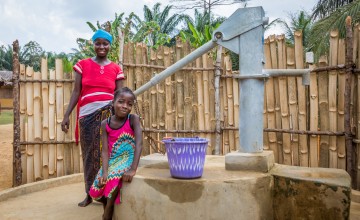
Read our 2024 annual report

Knowledge Hub
Water charges from the perspective of an aid worker

Martha Maguire explains how her work in Tanzania for Concern has influenced her thoughts about Ireland's water charges.
On 1 October, water charges took effect in Ireland.
Living away from home, I feel mostly unaffected by the whole thing – except that my Twitter and Facebook feeds are alight with protest.
I’m sure if I was living at home I'd be equally annoyed to pay for something that used to be free and that is in abundance in the country.
Different perspective
However, since moving to Africa six months ago to work with Concern Worldwide, I’ve developed a different perspective on the things I would generally take for granted back home.
Things like toilet bowls, hair conditioner and water are luxuries in rural Tanzania.
Every drop
In many parts of Tanzania, people have to walk up to eight kilometres to get water.
A decision is made with every drop of water: do I wash with it? Do I cook with it? Do I have enough to bath my family with it?
None of the women and children I've met make any fuss over the massive burden of fetching water.
They do it because they have to.
Measuring water is as habitual as waking up or going to sleep. So, while Ireland is getting used to its new water metering system, the people of rural Tanzania have been doing it all their lives.
Safe water
A big part of our work here is to improve the quality of water and sanitation in the area.
I spoke to Suzana Bahati, from Rwinyana Village in Ngara. She told me how Concern's work has made a huge difference to her life.
"We used to spend more than two hours a day collecting water," says Susana.
"But now, for the majority of us, we only spend a half an hour to come here and go back home with clean and safe water. I am very happy for that."
Donate to Concern's efforts to combat extreme poverty across the world.


